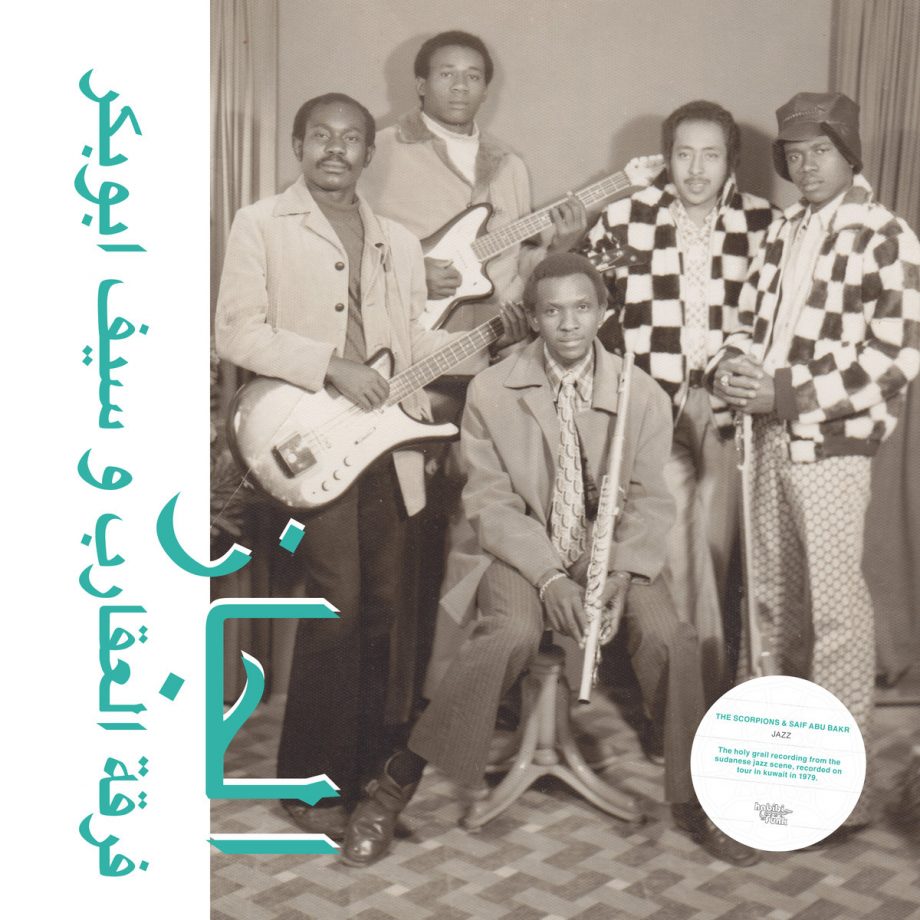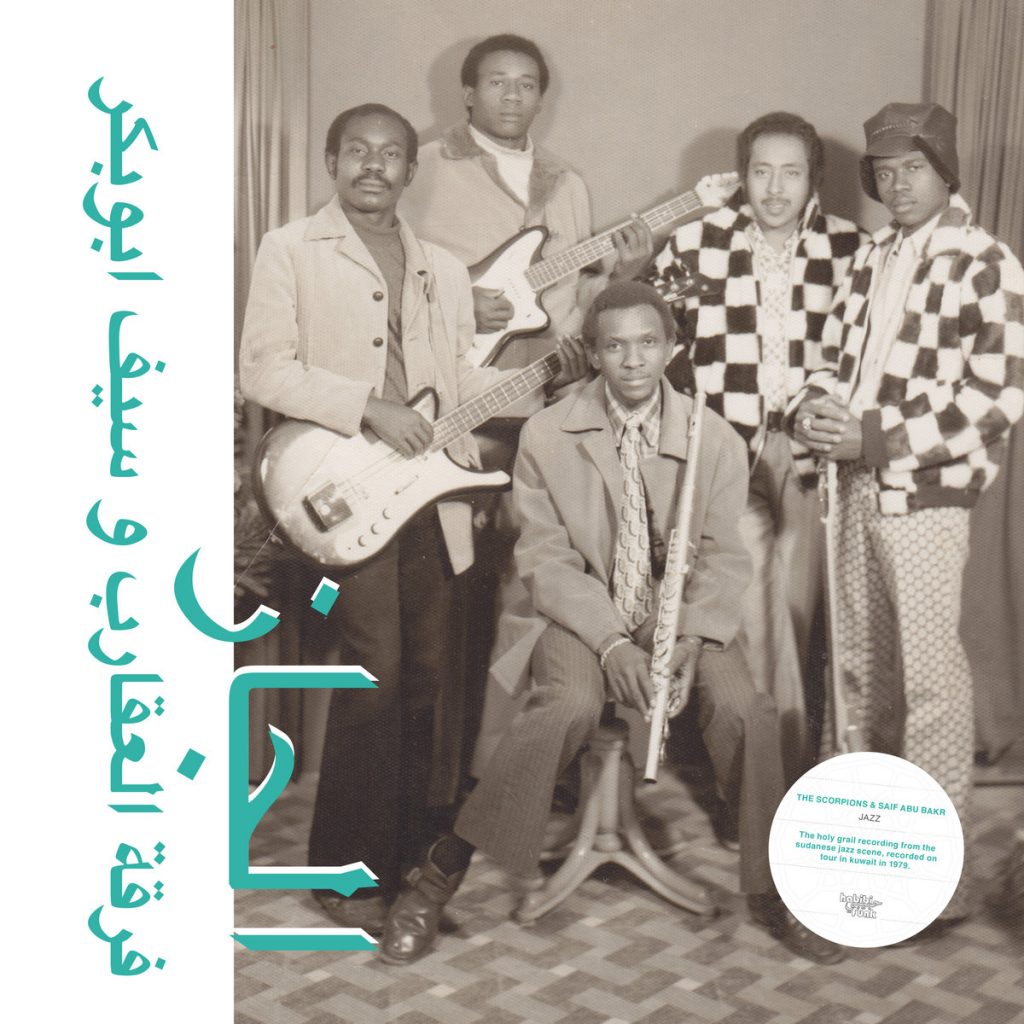
Morning Mari* Album of the Week for 12-16 November
The Scorpions & Saif Abu Bakr – Jazz Jazz Jazz [Habibi Funk Records] This week’s Morning Mari* album of the week is The Scorpions & Saif Abu Bakr’s “Jazz, Jazz, Jazz” out on Habibi Funk Records on the 9th of November, 2018. This album is one of the key albums of the Sudanese Jazz scene and…
Read moreThe Scorpions & Saif Abu Bakr – Jazz Jazz Jazz [Habibi Funk Records]

This week’s Morning Mari* album of the week is The Scorpions & Saif Abu Bakr’s “Jazz, Jazz, Jazz” out on Habibi Funk Records on the 9th of November, 2018.
This album is one of the key albums of the Sudanese Jazz scene and probably the most expensive one too with copies having sold for more than 1000$ on digital platforms. A unique fusion of styles recorded in Kuwait in 1980 is re-released this month. Jannis Stuertz who complied the album explains it with his own words:
“I heard about Saif Abu Baker and The Scorpions maybe 3-4 years ago. I was intrigued by the preview snippet of the music on this album as well as by the impressive artwork. This album happens to be my first conscious connection with Sudanese music. Habibi Funk must have already existed for a year or so but I had not yet come across any recording from Sudan that I felt fitting in the context we set for ourselves. I remember I did some quick research in the aftermath of the auction (which I obviously did not win) to gather some information about the band but apart from some vague bits and pieces I could not find anything. In the most encyclopedic overviews of the Sudanese music scene of the 1970s the band appeared as a mere footnote. How come? I really do not know. To me the music is a unique combination of incredibly powerful horn arrangements, a vigorous drummer contributing a funky backbone and Saif’s uniting all of these elements. The results range from instrumental tracks awaking memories of 1970s crime thriller soundtracks to more Sudanese-rooted tracks, a lot of them modernised versions traditional rhythms from the diverse regions of Sudan and even an excursion into Congolese Soukouss. While all of our reissues so far have been compilations in the sense that we put together our favourite selection of tracks by one artist, this album will be our first 1:1 re-release, simply because the quality of the albums does not fall off on a single track. With its eclectic influences it birthed a one-of-a- kind new mixture and serves as a blueprint for what we are looking for when we release music on Habibi Funk.
Fast forward to 2017. We had signed a release by Sharhabeel Ahmed in order to finish the project (Yes, this one is still coming…soon.) I planned my first trip to Sudan. Two Austrian friends of mine had just returned from Khartoum and had met Ali Dokka at one of the few remaining live music venues of the city Baba Costa. Ali performs at this cafe once a week to this day together with his band the Blue Stars. At some point in the 1970s, Ali was also the guitar player for The Scorpions. Sure enough I went to see one of his gigs and he was more than surprised to hear questions concerning this particular band from his musical history which he had nearly forgotten about. He told us to get in touch with Amir Sax. Amir is one of the band’s founding members and was The Scorpion’s band leader from the early 1970s until they parted ways sometime in the 1980s. Unfortunately Amir was not be found or reached during the last couple days of my stay but soon enough I was able to gather more information on him.
I went back to Sudan in December of the same year. In the meantime my local colleagues Larissa and Yassir had managed to reach Amir and he was happy to meet. We got together with him in a cafe right at the Nile in Omdurman, the city on the other side of the river from Khartoum. It was a happy occasion for everyone. He told us stories about him meeting Jimmy Cliff and Louis Armstrong when they visited Sudan and how he and his bandmates from The Scorpions played extensively in Kuwait, both in club residencies as well as for television. Amir brought tons of incredible photos illustrating not only the band’s history but the vivid cultural life in the many music clubs in Khartoum of the 1970s. During this decade up until 1983 the capital was home to a huge number of clubs, bars and concert halls. This scene started to perish after president Nimeiry’s turn away from his socialist policies, that he was widely associated with in the first decade of his rule, towards the implementation of Sharia law in 1983.
During the first decade of his rule he had actively supported various artists of the Jazz scene and was even taking artist like Kamal Keila and Al Balabil along with him to trips throughout Africa. The 1989 coup of Bashir and his generals then caused the final blow to a once thriving scene. Both of these political events within 6 years lead to significant drawbacks for the Sudanese jazz scene resulting in hardly any gig opportunities left and parties and concerts being critically observed by the regime. On top of it all month long curfews forced people to stay at home. A number of musicians faced prosecution, most of the time for their political views; some even left Sudan for good. Music never completely vanished from public life and even the regime kept selected artists close, instrumentalising them in their propaganda, but for a majority of those bands affiliated to the Jazz scene, life and making ends became a lot harder.
The Scorpions dissolved as a group around the same time. After the end of the band’s activity Amir continued to be a full-time musician playing at various occasions as well as in military bands. Saif Abu Bakr, the bands singer stayed in Kuwait after the recordings of the album and started pursuing a career outside the music industry although he kept on playing with other bands in Kuwait in his spare time to this day.
I’m writing these introductory words in early August 2018. It is a Sunday and tomorrow, The Scorpions will have one of their first rehearsals again. Saif Abu Bakr returned to his home country Sudan from Kuwait few weeks ago and the plan to re-release the music has been an igniting spark as well. Either way, it seems the narration of The Scorpions has not reached its end yet, let’s hope this will only be another starting point within the band’s long career. A starting point from which onwards they will receive a little more of the attention they had deserved right from the beginning; both by a new generation of Sudanese as well as by the rest of the world.
The re-release was produced with a clean copy of the vinyl version as a source. The original reel tape of the album stayed with Saif Abu Bakr along with another reel with other recordings that were never released. Unfortunately it was lost when Saif Abu Bakr had to flee to Kuwait temporarily during the second gulf war when Iraq raided Kuwait.”Tracklist:
1. Seira Music موسيقي السيرة .
2. Shaikan Music موسيقي شيكان
3. Saat Alfarah ساعة الفرح
4. Farrah Galbi Aljadeed فرح قلبي الجديد
5. Kaif Halo كيف حالو
6. Forssa Saeeda فرصة سعيدة
7. Nile Waves
8. Azzah Music موسيقي عزة
9. Bride Of Africa feat (Osman Zeeto ) عروس افريقيا غناء عثمان زيتو
10. Hilwa Ya Amoora حلوة يا أمورة